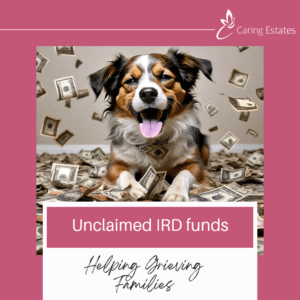Blog

Steps Involved in the Probate Process: What You Need to Know
We are so sorry for your loss. We know it’s a difficult time.
Caring Estates would love to assist you during this difficult time. Here are the steps involved with probate:
Step One: Establish what assets and liabilities the estate consists of
Establish what assets and liabilities the estate consists of.
Step Two: Administration based on estate assets
If the estate assets are less than $15,000 then the executor of the will can administer the estate without requiring a grant from the court. They should be able to deal with banks and other institutions by providing a copy of the Will, Death Certificate, their ID and proof of address.
If the estate assets are over $15,000, an application will need to be made to the court to administer the estate, called Probate. The original Will is required. Caring Estates can assist with the probate application by preparing the necessary documents in accordance with the High Court rules, arranging signing of the documents, and filing the application in court.
Step Three: Executor’s affidavit
If Probate is required, the executor will sign an affidavit. This can be done in front of a JP, if they are unable to come to my office for signing. I send all the documents with signing instructions by courier and provide a courier pack to send the documents back to me for filing in court.
Step Four: File an application to the High Court
If Probate is required, file an application to the High Court. There are several documents that need to be drafted which Caring Estates takes care of. The High Court charges a fee of $260 which can be waived if the executor receives a benefit from WINZ or is a pensioner. It can take up to 12 weeks for the application to be processed through the court.
Step Five: After administration is granted
Once administration is granted, bring in all the assets and then pay all debts. Caring Estates can assist with this, if needed.
Step Six: Handling property and land
If there is a land/house, then this will be transmitted to the surviving joint owner. If the land/house is not owned jointly, then the property will be registered to the executor and then it can either be sold or transferred to the beneficiaries of the will.
Step Seven: Distribution of estate assets
Once all bills are paid (including reimbursement for funeral and/or legal fees), the estate assets can be distributed in accordance with the Will.
We usually recommend waiting 6 months from the date that probate is granted before distributing to protect the executors from any personal liability. We can discuss this with you further.
Caring Estates’ Fees
Our fee for obtaining Probate is $1,500 plus GST and $260 High Court fee (unless the High Court fee is waived) and courier fees, if paid up front.
There are extra fees if paying later and/or to assist with the estate administration such as obtaining funds, paying debts, and distributing to the beneficiaries. These are fixed fees and depend on how much assistance you require. After discussing your needs, Caring Estates will give you a clear fee.
Getting Started: Information Needed
To get the ball rolling, please provide email hayley@caringestates.co.nz the following:
- The executors’ contact details (phone number and email address).
- the executors’ occupations.
- The executors’ IDs. Passport is best but if you are unable to provide a current passport, then a driver’s licence (front and back) and a secondary ID.
- The executors’ proof of address dated less than 6 months such as utility bill, rates bill, insurance policy, car registration demand, IRD tax notice with your name and address.
- Death certificate.
- Copy of the will.
- The deceased’s ID.
- Where is the original will being held?
You may email scanned copies or photos in the first instance and obtain certified copies when meeting with me or the JP for signing the documents.
Caring Estates will begin preparing the documents immediately after receiving the necessary information and will keep in regular contact with the executors throughout the process.





